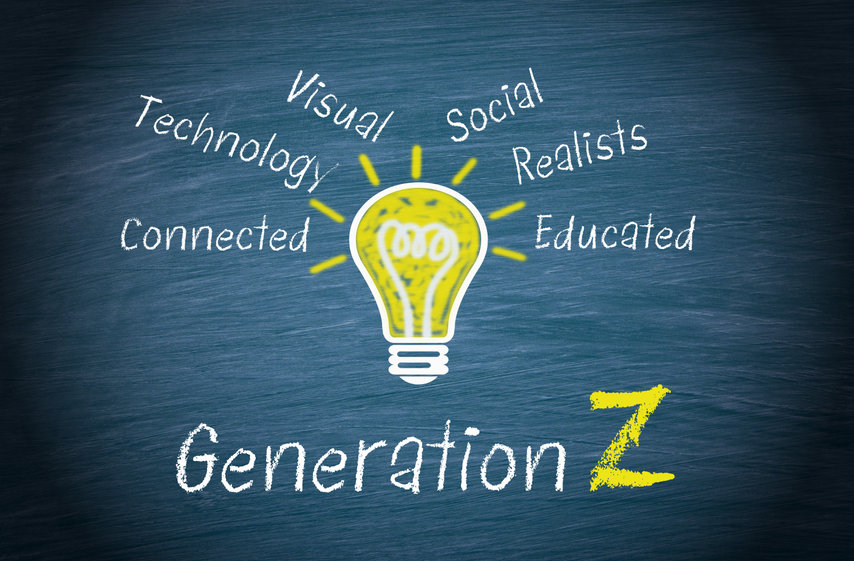
For many years, Baby Boomers were the dominant generation in the workplace. Millennials and Gen X followed, but now the water cooler talk is about Generation Z (Gen Z). Born after 1996, most members of Gen Z are not yet old enough to vote. At the same time, their sheer numbers still leave roughly 24 million Gen Zers of age—the oldest of whom are in their mid-20s and entering the workforce. Just like with previous generations, it’s time to start preparing to work with Gen Z.
Facts to Help Understand Gen Z

No one wants to stereotype a generation. Here is some information to better understand their impact, background and potential contributions to the workforce of the future.
- They represent huge numbers. Research projects that by 2025, Gen Z will make up about 27 percent of the workforce. Although they are still young, they’re gearing up to take the workplace by storm. Their presence will impact the private and public sectors as they strive to earn recognition for their contributions.
- They are the hardest hit by unemployment caused by COVID-19, with an unemployment rate almost two times more than any other generation. Due to their age and overrepresentation in the hard-hit service industry, according to Pew Research, half of Gen Zers ages 18 to 23 reported that they or someone in their household had lost a job or taken a cut in pay because of the Coronavirus pandemic. “Unlike the Millennials who came of age during the Great Recession, this new generation was in line to inherit a strong economy with record-low unemployment,” says Kim Parker, director of social trends research at Pew. “That has all changed, as a result of the COVID-19 pandemic that reshaped the country’s social, political and economic landscape. Instead of looking ahead to a world of opportunities, Gen Z now peers into an uncertain future.” While uncertainty is a certainty for Gen Z, they have proven themselves adaptable problem-solvers and quick-learners. Their familiarity with and acceptance of uncertainty impacts their tolerance for risk-taking and ability to function in unstable work environments.
- They embrace inclusivity and equality. Gen Z is more racially and ethnically diverse than previous generations. In 2002, 61 percent of Millennials were non-Hispanic white. Only 52 percent of Gen Z are non-Hispanic white. One in four Gen Zers are Hispanic, 14 percent are black and six percent are Asian. The other five percent are another race or a combination of two or more races. These demographic shifts, along with ongoing education, social value systems and a multicultural and globally connected society, are helping Gen Z to lead the charge in better representation and inclusion of diverse groups within business, entertainment, government and academia. Gen Z seeks to impact business practices, etiquette and policies to seek social, racial and gender equality.
- They have strong value systems and are passionate about their causes. While other generations are happy to express their political and moral views online, members of Gen Z are willing to back up their beliefs when it comes to their personal and professional lives. The majority of Gen Zers will make sure a company aligns with their personal values before making a purchase. Likewise, Gen Z employees want to work for organizations sharing their stance on important issues inside and outside the workplace.
- They are proponents of higher education. More likely to pursue college compared to earlier generations, Gen Z is on track to be the best-educated generation yet. Among 18- to 21-year-olds no longer in high school in 2018, 57 percent were enrolled in a two- or four-year college. This same statistic was five percentage points lower for Millennials in 2003. It was 14 percentage points lower for members of Generation X in 1987. Generation Zers are also climbing a longer academic ladder. They tend to pursue higher-level degrees or multiple degrees in different fields. It’s also interesting to note that Generation Z teens, 15- to 17-year-olds, are less likely to be employed relative to their same-age counterparts in earlier generations, most likely due to prioritizing school. When hiring and training Gen Z as employees, recognize they will have less real-world experience compared to their classroom experience.
- They are digital natives. Members of Gen Z have little to no memory of the world before the internet and smartphones. This means they are tech-savvy. They are comfortable learning new technical skills, discovering and interacting with virtual communities, and innovating in digital spaces. In addition to instinctive skillsets, Gen Z’s digital nativity has made them more globally connected. Dubbed “the global generation,” Gen Z has had access to worldwide news, trends, groups and individuals for their entire lives, making them the most internationally informed, interconnected and resourceful generation yet.
The Future of Work

Whether working with new graduates, college interns or looking ahead to the workforce future, Gen Z is a rising tide. It’s true they have a reputation for being glued to their phone screens. Yet, members of Gen Z have much to offer to today’s organizations. Their fresh ideas, strong work ethic and deep value systems make them valuable assets to companies willing to meet them where they want to be met. To attract and retain this new group of workers, organizations need to update their mindsets and adopt a speed of evolution that matches the pace of today’s world. Seek to understand and communicate with this tenacious, educated and multicultural generation, to incorporate their forward-thinking, confidence, passion and unique skillsets into the workplace in meaningful ways.
